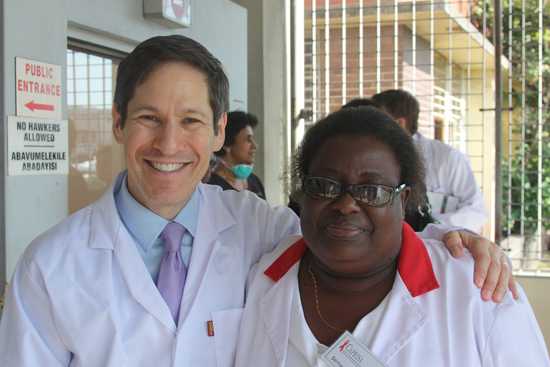Back to the Basics
Focus on the basics. This was the primary message CDC Director Dr. Tom Frieden shared with CDC-South Africa partners on a recent whirlwind visit to the country in June.

CDC Director, Dr. Tom Frieden, and CAPRISA’s Bernadette Madlala pose at the recent tour of the CAPRISA eThekwini Clinical Research Site in Durban, KwaZulu-Natal, South Africa, as part of the PEPFAR Annual Meeting 2014.
See Dr. Frieden's Trip to South Africa - June 2014 (Part 1)
See Dr. Frieden's Trip to South Africa - June 2014 (Part 2)
See Dr. Frieden's Trip to South Africa - June 2014 (Part 3)
Focusing on the basic building blocks of public healthcare and the flawless implementation thereof was CDC Director Dr. Tom Frieden’s main message to Centers for Disease Control and Prevention (CDC) South Africa (SA) partners when he recently visited the sea-side town of Durban, KwaZulu-Natal, in South Africa. Dr. Frieden was in SA from 1 June to 4 June and used the opportunity to visit a number of PEPFAR-funded CDC-SA supported sites and engage not only the partners, but also key healthcare role-players on a number of critical programs and practices underway in SA.
One of the sites visited with a number of other PEPFAR delegates was the Center for AIDS Programme and Research in South Africa (CAPRISA) eThekwini Clinical Research Site, in the heart of one of the busiest taxi ranks in the Durban Central Business District (CBD). CAPRISA is one of SA's best known research organizations and has successfully integrated research and service delivery for innovations with powerful impact on the HIV/AIDS response, both in SA and globally. The Durban (eThekwini) site is located at the Prince Cyril Zulu Communicable Disease Center, a primary health care clinic first opened in 1955 and currently dedicated to the treatment of tuberculosis (TB) and HIV among local residents. The clinic comprises two sections, a Treatment Clinic for HIV-TB co-infected patients and a Prevention Clinic that cares for high risk clients infected with sexually transmitted infections. It is one of the largest TB clinics in SA and provides care to approximately 10,000 TB patients and notifies approximately 3,500 new TB cases each year. The daily patient attendance at this clinic ranges from 300-400. The CAPRISA AIDS Treatment (CAT) program is a model for HIV counseling, testing and treatment services integrated into a TB and primary health care service platform.
Dr. Frieden was also given a tour of the Southern African Clothing & Textile Workers' Union (SACTWU) Workers’ Health Program (SWHP) Gale Street Clinic, before engaging SACTWU Workers’ Health Program staff at the site in a discussion around the local medical male circumcision (MMC) context and their experiences relating to the uptake and acceptance thereof. Not only is SACTWU the largest trade union in the clothing, textile, leather and footwear industry in SA, the SWHP is also currently the highest performing CDC and PEPFAR partner in MMC service delivery, with more than 100,000 circumcisions to date, since 2010.
Shortly before departing SA, the South African Department of Correctional Services (DCS) hosted Dr. Frieden at the Durban Westville Correctional Facility, where he was given a tour of the Health Program facilities on site. The Correctional Facility setting provides a unique environment for the spread of TB and HIV with high disease prevalence. The Durban Westville Correctional Facility is the second largest correctional facility in SA, housing approximately 11,000 offenders at a given time. The majority of offenders in Durban Westville are male (approximately 97%). There is a high turnover rate (approximately 80% per year) and, at any given time, about 30% of the offender population in this prison is awaiting trial or are un-sentenced offenders.
Currently, through funding from and technical collaboration with CDC, the National Health Laboratory Service (NHLS) is providing quality assurance services to GeneXpert testing throughout the country, including Correctional Services – evidenced by the newly renovated NHLS managed laboratory on site. TB screening is voluntary for all offenders except new admissions/offenders newly entering a facility; for this group TB screening is mandatory. The GeneXpert TB screening program at the Durban Westville Correctional Facility has been ongoing from mid-March 2013 to date and is the result of a multi-partner collaboration by, amongst others, the NHLS, the Aurum Institute and Right to Care. The GeneXpert TB screening program’s goal is to assess the feasibility and impact of using GeneXpert as a point of care TB testing tool in prisons.
- Page last reviewed: July 1, 2014
- Page last updated: July 1, 2014
- Content source:
Global Health
Notice: Linking to a non-federal site does not constitute an endorsement by HHS, CDC or any of its employees of the sponsors or the information and products presented on the site.


 ShareCompartir
ShareCompartir